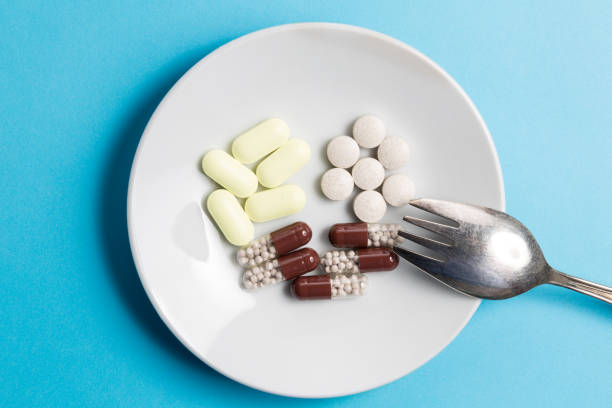Supplements and Herbs
Can You Take Collagen Supplements While Fasting
Collagen supplements have grown in popularity in recent years as a result of its potential advantages for skin, hair, nails, and joint health. However, with the development of intermittent fasting, many people are wondering if using collagen supplements while fasting is healthy.
Intermittent fasting entails fasting for a set amount of time, often 12-16 hours, and then consuming all of your daily calories within a set window of time. During a fast, your body uses stored energy, such as glucose and fat, as fuel.
So, can collagen supplements be taken while fasting? The answer is complicated and relies on the type of fast you’re doing as well as your own fasting goals. In this post, we will look at the research behind collagen supplements and fasting, as well as when and how to take them while fasting.

Understanding Fasting and Collagen Supplementation
The Role of Collagen in the Body
Collagen is a protein found in every cell of the body, including the skin, joints, and bones. It is in charge of keeping these tissues’ strength and elasticity. Collagen is composed of amino acids such as glycine, proline, and hydroxyproline, all of which are necessary for the body’s overall health.
Basics of Fasting
Fasting is the practice of going without food and water for an extended length of time. Also fasting has been performed for ages and is frequently linked to religious or spiritual pursuits. Fasting has grown in favor as a technique to enhance health and lose weight in recent years. Intermittent fasting, which involves alternating periods of fasting and eating, is one type of fasting.
Collagen Supplements Overview
Collagen supplements are a common technique to boost the body’s collagen levels. While Collagen supplements come in a variety of forms, such as collagen powder, hydrolyzed collagen, and collagen peptides. These supplements are frequently marketed for their possible health benefits, which include improved skin health, joint health, and weight loss.
When it comes to fasting, there is some disagreement about whether collagen supplements break the fast. Some scientists believe that taking collagen supplements during a fast can disrupt autophagy, the process by which the body breaks down and recycles damaged cells. Others, on the other hand, say that taking collagen supplements during a fasting period can boost the benefits of fasting by increasing weight reduction, enhancing skin health, and decreasing hunger cravings.
It should be noted that collagen supplements contain calories, and even modest amounts of calories can have an impact on insulin and blood sugar levels. As a result, it is critical to select a collagen supplement that is low in calories and free of added sugars and other additives.

Impact of Collagen on Fasting
When it comes to fasting, one frequently asked issue is whether collagen supplements break a fast. In this section, we will look at how collagen affects fasting and the potential benefits and risks of taking collagen supplements during fasting.
Does Collagen Break a Fast?
The answer is dependent on how you define fasting. Yes, collagen supplements technically break a fast if you define fasting as abstaining from all food and drink. Collagen supplements contain approximately 30 calories per scoop, which can result in a minor insulin release and potentially disrupt autophagy, the process by which the body gets rid of damaged or dying cells and replaces them with healthy new ones.
However, some proponents of intermittent fasting say that taking a modest number of calories during a fast, such as those contained in collagen supplements, does not fully break the fast. It should be noted that this is a contentious issue, with no clear consensus on whether collagen supplements break a fast.
Benefits of Taking Collagen While Fasting
Taking collagen supplements during fasting may have various advantages. Collagen is a protein that is necessary for good skin, joint function, and overall wellness. Which collagen can assist preserve lean muscle mass, decrease hunger cravings, and enhance fat burning when consumed while fasting. Collagen supplements may also enhance cellular repair and boost metabolic health.
Potential Risks and Considerations
While using collagen supplements while fasting may have certain advantages, it is crucial to weigh the dangers and downsides. Collagen supplements, for example, may contain chemicals or fillers that increase calorie intake and potentially disrupt the fasting process. Furthermore, taking collagen supplements while fasting may not be appropriate for everyone, especially those with specific health concerns or who are pregnant or breastfeeding.
In conclusion, whether to use collagen supplements while fasting is a personal choice that should be discussed with a healthcare expert. While there may be possible benefits to taking collagen supplements while fasting, they should be balanced against potential dangers and individual health needs and goals.

Collagen Supplementation Timing and Practices
Because of their potential health benefits, collagen supplements have grown in popularity in recent years. However, if you are fasting, you may be asking if taking collagen supplements is safe. This section will go over the optimum times to take collagen while fasting and how to choose the finest collagen supplements.
Best Times to Take Collagen During Fasting
Timing is everything when it comes to taking collagen supplements while fasting. To avoid breaking the fast, it is advised to take collagen supplements throughout the feeding window. Taking supplements within the meal window allows your body to absorb and effectively utilize the nutrients.
It’s also worth noting that taking collagen supplements on an empty stomach can create digestive issues. As a result, it is advisable to take vitamins with or during a meal.
Choosing the Right Collagen Supplements
When selecting collagen supplements, it is critical to choose high-quality, safe, and effective products. Look for hydrolyzed collagen or collagen peptides, which have been broken down into tiny molecules and are more easily absorbed by the body.
Unflavored collagen protein powders or peptide powders are also excellent choices because they may be readily included into smoothies or other liquids. It’s a good idea to look over the ingredients list for additional sugars or other additives.
In conclusion, taking collagen supplements while fasting can be both safe and helpful if done right. You can enjoy the potential health benefits of collagen supplements without breaking your fast if you follow the recommended guidelines.
Complementary Fasting Beverages and Supplements
Many people who are fasting worry what they can eat without breaking their fast. While collagen supplements are a popular choice due to their high protein content and potential health advantages, it’s also necessary to evaluate what other liquids and supplements are suitable for fasting.
Can You Drink Coffee or Tea While Taking Collagen?
Yes, when using collagen supplements, you can drink coffee or tea. It should be noted, however, that adding sugars or creamers to your coffee or tea can break your fast. To avoid breaking your fast, stick to black coffee or simple tea.
Other Supplements to Consider While Fasting
Aside from collagen supplements, there are a few additional vitamins that can help you with your fasting practice. Consider the following options:
- Electrolytes: Fasting can cause an imbalance in electrolytes, so it’s important to replenish them with supplements like potassium and magnesium.
- Multivitamin: Taking a multivitamin can help ensure you’re getting all the necessary vitamins and minerals during your fast.
- B Vitamins: B vitamins are important for energy production and can help combat fatigue during a fast.
- Fat-Soluble Vitamins: Vitamins A, D, E, and K are fat-soluble and can be taken with a small amount of fat to aid absorption.
- Water-Soluble Vitamins: Vitamin C and the B-complex vitamins are water-soluble and can be taken on an empty stomach.
It’s crucial to note that, while supplements can help you fast, they should never be utilized in place of a good diet. Before beginning any new supplement regimen, always consult with a healthcare expert.
Conclusion
As I wrap up this exploration into the intersection of collagen supplements and fasting, my own journey has been one of curiosity and mindful experimentation. Navigating the realm of wellness often involves blending traditional practices with modern insights.
In my experience, incorporating collagen supplements during fasting has been a nuanced experiment. While science sheds light on potential benefits, individual responses vary. It’s a reminder that wellness is a deeply personal journey, requiring an attunement to one’s body and its unique signals.
So, whether you choose to embrace collagen supplements during fasting or not, the key lies in an informed and balanced approach. As with any health decision, it’s the harmony between tradition, science, and personal intuition that paves the way for a holistic and sustainable wellness path.


